In the News

Farming for the future: Building resilient food systems in a changing environment
January 5, 2026 | UW Center for Health and the Global Environment
Jennifer Otten is interviewed by the Center for Health and the Global Environment at University of Washington about the effects of environmental change on food systems, and offers a vision for what resilient food systems look like in practice. “A resilient food system is one that can absorb shocks like climate change, pandemics, and economic disruptions and still ensure equitable access to healthy food,” Otten said.
Read article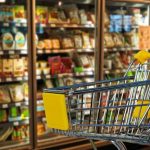
Households using more of the most popular WIC food benefits stay in the program longer, UW study finds
December 15, 2025 | UW News
New research has found that households who redeem more of their benefits in the most popular food categories are more likely to remain in the program long-term. Assistant Professor Pia Chaparro is first author on the study published in JAMA Network Open. “Finding ways to identify kids and families that are at risk of dropping out of the program is of high importance,” said Chaparro. “That’s basically what we’ve identified — a way to flag families who may be at risk of dropping off.”
Read article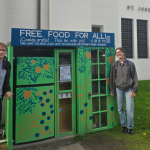
With community fridges, neighbors feed each other
December 5, 2025 | UW Environmental & Occupational Health Sciences
FSNH faculty Marie Spiker will collaborate with UW Urban Freight Lab to improve safety and efficiency of hyperlocal food sharing via community fridges that are accessible 24 hours a day for the public to take and leave food. “Because they’re decentralized, it’s hard to know whether a micropantry is full or empty, or whether a community fridge is at a safe temperature,” Spiker said. “The sensors and information dashboards this team is developing will go a long ways towards helping us understand the potential of micropantries to reduce waste and distribute food safely at a community level.”
Read article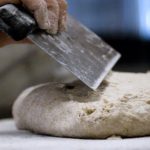
Statewide effort to put more whole grains on shelves and plates gets $19 million boost
October 29, 2025 | UW News
New statewide initiative to put more healthy, climate-friendly grains on people’s plates will include faculty from the Food Systems, Nutrition, and Health program as the project’s implementation science team including Jennifer Otten, Sarah Collier, and Marie Spiker. The FSNH team will examine how innovations in grain breeding and food product development can be successfully adopted in school settings, and will study what policy, budgetary, and social factors help ensure that new whole grain and legume varieties are embraced across the supply chain and, ultimately, by school-aged children who rely on them for the nutrition they need to grow and thrive.
Read article
Wait, Are Carbs Actually Awesome?
October 9, 2025 | Men's Health
UW faculty member Adam Drewnowski is quoted in this article discussing perceptions about carbohydrate consumption, and helps clarify how to choose nutritionally optimal carbohydrates which can be beneficial to your diet and long term health.
Read article
Seattle to launch first connected network of community food micro-pantries
September 22, 2025 | UW Freight Lab
FSNH faculty member Marie Spiker is involved in this pilot research project that will retrofit existing micro-pantries in Seattle with sensors to create a “cyber-physical” network. The system will anonymously track pantry use, donation patterns, and food safety, giving communities real-time data to improve food distribution and reduce waste. The project also aims to strengthen safe, reliable food supply chains and foster collaboration between donors, volunteers, and recipients.
Read article
Some refined grains are surprisingly nutritious
September 5, 2025 | earth.com
Adam Drewnowski’s work in a recent study published in Nutrients that combined diet records with health markers such as weight, waist size, insulin levels, and food costs to identify foods which not only improved health, but were affordable. Drewnowski said, “Our evaluation took whole grain content into account, along with fiber, vitamins and minerals. By delivering key nutrients such as fiber, iron, B vitamins and folate, grain foods can make a meaningful contribution to healthier eating patterns among all population groups.”
Read article
USDA freezes UW project that turns Washington shellfish farmers’ seaweed problem into soil solution for land farmers
August 4, 2025 | UW News
The Blue Carbon, Green Fields project was a multi-year collaboration between the UW, Baywater Shellfish, Puget Sound Restoration Fund, Washington Sea Grant, Washington State University, and farm business incubator Viva Farms, focused on removing more than 17,000 pounds of seaweed from shellfish beds and applying it to crops on four local farms. The U.S. Department of Agriculture funded the project in 2023, but then abruptly pulled the plug in April 2025. Food Systems core faculty Sarah Collier is the project lead and is featured in this video and story talking about how the project hopes to continue with alternate funding.
Read article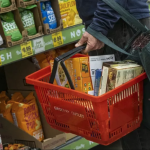
Gobsmacked by groceries, Inflation inching higher for Washington consumers weary at the market
February 16, 2025 | The Spokesman Review
The Spokesman Review highlights both the national trends of food costs, as well as Washington state trends, pointing to a report released in February from the Washington State Food Security Surveys, showing that state residents continue to worry about food prices.
Read article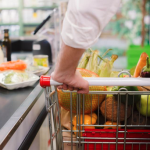
UW, WSU study shows WA residents struggling to pay for one particular monthly expense
February 17, 2025 | The Bellingham Herald
This article by the Bellingham Herald highlights findings from the fifth edition of the Washington State Food Security Survey released on Feb. 13, revealing a potential rise in food insecurity in Washington.
Read article